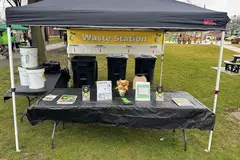Key takeaways
- Closed Loop Partners, BPI, and USCC fund projects to expand composting infrastructure and food-contact compostable packaging recovery.
- Selected projects cover eight US states targeting underserved communities and facility upgrades.
- The initiative aims to reduce food and packaging waste, create compost for soils, support green jobs, and advance a circular economy.
The Composting Consortium, managed by Closed Loop Partners’ Center for the Circular Economy, has selected municipal and compost producer-led projects across the US to receive grant funding to improve composting infrastructure and the recovery of food-contact compostable packaging.
The Composting Consortium’s funding partners are the Biodegradable Products Institute (BPI), with technical support from the US Composting Council (USCC). The organizations aim to scale circular outcomes for certified compostable packaging and food scraps as industry and consumers seek ways to reduce food and packaging waste sent to disposal.
Kate Daly, managing partner and head at Closed Loop Partners’ Center for the Circular Economy, says: “The deployment of these grant dollars is a critical part of Closed Loop Partners’ Center for the Circular Economy’s broader work to develop local circular systems. ”

“Our partnership with BPI and USCC on this inaugural grant program showcases the power of industry leadership and collaboration to deliver outsized impact, accelerate infrastructure upgrades, and advance food waste and compostable packaging diversion goals.”
Expand regional capacity
Eight projects demonstrating scalable models for compostable packaging recovery and community engagement were selected for the funding opportunity.
Projects in Washtenaw County, Michigan, Takoma Park, Maryland as well as the Rubber City Reuse project in Northeast Ohio focus on increasing equitable access to composting infrastructure and services, particularly looking into areas or populations within the US that have historically been underserved.
Projects from Colorado, Virginia, Pennsylvania, and Washington State aim to increase the ability of compost facilities to accept and process certified compostable packaging, a step in keeping materials out of landfills and transitioning to a more circular economy.
The project by the City of Modesto, California, emphasizes education, storytelling, and community engagement to increase certified compostable packaging diversion and create finished compost that can be used to enhance local soils.
Rhodes Yepsen, executive director at BPI, comments: “This grant program is more than just funding. It’s about building a foundation for a circular bioeconomy that works in practice and eventually at scale.”
“Each project helps fulfill the value proposition of compostable packaging, transforming food scraps and food-contact compostables from everyday waste into a valuable soil amendment, creating good green jobs, and fostering resilient, thriving communities.”
Linda Norris-Waldt, executive director at USCC, adds: “The innovation and ingenuity we saw in the applications and selected projects make one thing clear: the composting industry is ready to grow, and targeted funding can unlock transformative change.”













